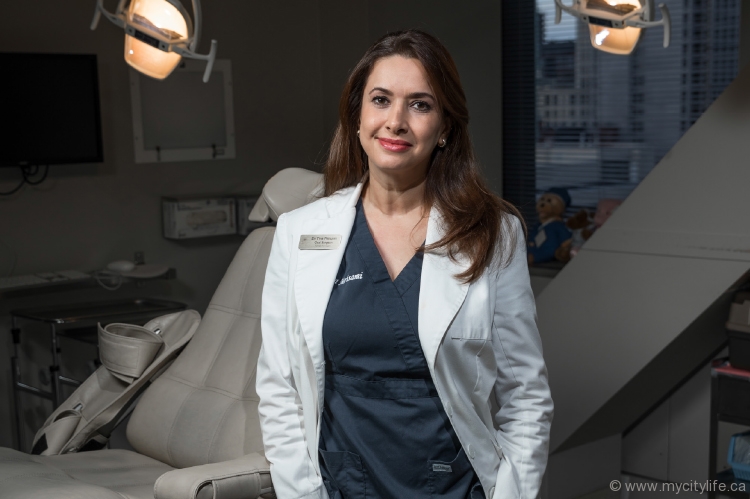Project Restoring Smiles offers dental care at no cost to survivors of domestic violence. Its founder, Dr. Tina Meisami, and team of dedicated medical professionals talk about their passion for the project – and the role self-confidence plays on the road to female empowerment.
At one point or another, everyone experiences loss — of a loved one, a friend or an acquaintance. It changes us, and sometimes inspires us.
When Toronto-based oral and maxillofacial surgeon Dr. Tina Meisami lost her beloved brother, Dr. Borna Meisami, she lost her guardian, role model and biggest supporter. The world lost an accomplished orthopedic surgeon, a compassionate feminist and a dedicated advocate for women’s rights.
It was through her grief that Dr. Meisami came to understand that she needed to honour her brother by continuing his legacy as a humanitarian. Since its inception in 2011, the Dr. Borna Meisami Foundation has been dedicated to Project Restoring Smiles, a program that offers professional dental care at no cost to women who’ve experienced abuse, helping them regain their oral health and self-confidence by restoring their smiles.
Sadly, the need for these services is great. According to Statistics Canada, on any given night in Canada, roughly 3,491 women and their 2,724 children are sleeping in shelters because it is unsafe at home. Of these women, five in 10 have reported being physically injured. Visible trauma to their mouths can be considerable and, given the accompanying emotional suffering, it’s only part of their pain.
“It wasn’t until I lost Borna that I realized how lucky I was to have a role model and supporter like him, because most people don’t have that at all,” says Dr. Meisami. “I hoped [with the foundation] I would create that sense of security, the sense that someone’s got your back. I think it’s incredible to be able to provide that for these women living in shelters who are at a dead end.”
The charitable foundation that fuels Project Restoring Smiles is overseen by Dr. Meisami and a dedicated team of doctors in the field of dentistry and works directly with women’s shelters across the Greater Toronto Area. All of the doctors involved work on a volunteer basis, running their own practices full-time while dedicating their personal time to contributing their expertise and resources to helping women who have experienced abuse.
“EVEN THOUGH YOU KNOW AND READ ABOUT [ABUSE] AND YOU’RE AWARE, IT’S SOMETHING ELSE TO SEE FOR YOURSELF, AS A CARE PROVIDER, THE IMPACT OF ABUSE” — DR. MEISAMI
Dr. Meisami admits that initially the team faced a number of obstacles in linking up the project with shelters. For the safety of residents, for instance, there were strict security protocols to follow. So the surgeon and her team made dozens of cold calls, visiting the shelters in person, before finding the first five to participate; now the project has approximately 25 affiliations.
Emotions run high as the doctors recall their first experiences meeting shelter residents, who were often there with young children. “Even though you know and read about [abuse] and you’re aware, it’s something else to see for yourself, as a care provider, the impact of abuse,” says Dr. Meisami.
“A lot of it was not about front teeth. It was about neglect. They were dealing with so many things,” adds Dr. Yasmin Mawji, founding board member of the Dr. Borna Meisami Foundation.

One thing Dr. Mawji believes makes a difference is that participating doctors host patients from the project in their regular practices. “No one ever knows that the women are pro-bono, because they visit and check in like any other patient would,” says Dr. Mawji.
The project performs services and procedures that average a total of nearly $150,000 a year, with total contributions surpassing half a million dollars. But Dr. Meisami isn’t stopping anytime soon, and the team is actively seeking more dental experts, administrative staff and financial contributors to volunteer, in order to help the project grow.
Fellow founding board member Dr. Renu Varshney says she focuses on the success and progress the women experience after being helped by Project Restoring Smiles. “Our patients are otherwise capable women that have just been in really bad situations,” says Dr. Varshney. “They just need a bit of a helping hand.”
Dr. Varshney is always inspired by the change in the women’s confidence. “I know we’re supposed to be there to empower them, and I feel like in the end they start to empower us,” says Dr. Varshney.

The doctors never pry, but their project clients sometimes feel comfortable enough to open up about their struggle, and that’s when Dr. Meisami and the team will offer whatever encouragement and support is needed. Most often all the women need is an ear.
Dr. Meisami recalls conversations she had with her brother when she was an emerging young medical professional and credits a great deal of her confidence and resilience to his unconditional support and advice. “He used to tell me, ‘As a woman in a “man’s field,” you have to be better, you have to be stronger and you have to work so much harder, because it’s so much easier for men,’” she says.
So it was from a young age that Dr. Meisami realized the value of female empowerment and the importance of encouraging other females, regardless of their circumstances, to feel it for themselves. Now, her project has become a platform that promotes progress in gender equality.
“I have two young daughters, and recently I realized that in their innocence they have no sense that there is such a thing as inequality,” says Dr. Meisami. “I think one of the things that drives me is the hope that my children don’t have to deal with a lot of issues we’ve had to deal with — or that we see these women dealing with — in the next 30 or 40 years.”
PHOTOS BY ROBIN GARTNER
This article originally appeared in My City Life

